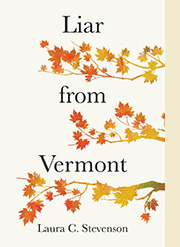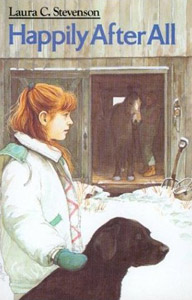A New Series: One Minute Reviews of
Books by Vermont Authors
Laura's column "One Minute Reviews" has appeared bi-weekly in Wilmington, Vermont's Deerfield Valley News since 2015. In April 2018, she found that no Vermont periodical consistently reviews all commercially published fiction and non-fiction by Vermont authors, so she started a series to fill that void. Published reviews from that series and some earlier reviews of local authors are listed with links to a scan of the printed copy. Reviews still in queue are listed without links until they appear in print.
The books reviewed in this series are available through Wilmington's Pettee Memorial Library, the Whitingham Free Public Library, and locally owned Bartleby's Books in Wilmington.
Deerfield Valley News, 5/30/2019
Final Volume of an Exciting RussianTrilogy
Katherine Arden, The Winter of the Witch. Del Rey, 2019.
The Winter of the Witch is the third volume of Katherine Arden's Winternight Trilogy, a fantasy set in medieval Russia (Rus') and deftly incorporating the country's rich fairytale tradition. The first volume, The Bear and the Nightingale, follows the adventures of Vasilisa Petrovna (Vasya), the daughter of a northern boyar. From her earliest childhood she has had the ability to see the chyerti, spirits that range from the protectors of the house and stable to the Winter King Morozko, the spirit of death, and his fraternal rival the Bear, the one-eyed spirit of fear and chaos. The Bear, bound for centuries by Morozko, needs Vasya's talents to free himself. He finds an unwitting ally in the local priest, Father Konstantin, and together they terrify the village, which whispers that Vasya is a witch. Thus shunned, she sets out on a solitary path on her beloved horse Solovey, a gift from Morozko. The Girl in the Tower follows Vasya as she rides through Rus', dressed as a boy. Romantically, she comes to return the difficult love of the immortal Morozko; politically, her bravery attracts the admiration of the disguised sorcerer Kaschei, and of Dmitrii, the Grand Prince of Moscow. Joined by her brother Sasha, a monk and Dmitrii's trusted advisor, she helps defeat the bandits that have been pillaging the countryside. In Moscow, she is reunited with her sister Olga, now the Princess of Serpukhov, whose daughter shares Vasya's ability to see chyerti. Dmitrii favors Vasya until Kaschei dramatically reveals that she is a girl, a move that's part of his larger plan to assassinate Dmitrii and take over Moscow. In the chaos surrounding his attack, Vasya frees Kaschei's horse from its cruel golden bridle—and it rises into the air as the firebird, setting a fire that burns half the city.
The Winter of the Witch opens the day after the Moscow fire, with a mob that Father Konstantin, now increasingly the Bear's pawn, encourages to burn Vasya as a witch. Though she suffers a terrible loss, she escapes the fire and enters the land of Midnight, a magical world in which one can travel anywhere, so long as it is midnight where one is going. There she learns her family's matrilineal history of magic, and from there, she journeys to free Morozko, who has allowed himself to be imprisoned by the Bear in return for Vasya's life. Together, they bind the Bear with Kaschei's bridle in an attempt to forge an alliance between men and chyerti. But as Vasya soon learns, that's a mistake; it's necessary to incorporate all chyerti, good and evil, in any alliance. Vasya frees the Bear and makes him serve her, and with Morozko's help she persuades Dmitrii and the holy father Sergei to let the chyerti of Rus' support its princes in the great battle of Kulikovo against the invading Tatars. We are not allowed to rejoice at the victory, though it ensures the future of both Rus' and the chyerti. "Even for that, the price was very high," says Vasya, looking over the terrible carnage. Morozko, who has carried thousands of soldiers to his lands, has no reply.
Like the other volumes in this trilogy, The Winter of the Witch is exceptionally good. Behind it lies Arden's substantial understanding of Russian history and of Dvoeveriye—the double faith in Christianity and pagan spirits that characterized Russian belief until the 1917 Revolution. It is also informed by a solid knowledge of the epic tradition, graced by deep psychological understanding. The tormented Father Konstantin, who paints beautiful icons but can't tell God from demon, the destructive, cruel Bear who loves beauty, the holy Father Sergei, whose faith enables him to respect the chyerti, the brave and limited Dmitrii, the valiant Sasha, who gradually supports his sister's vision for Rus'—these, along with the unpredictable chyerti and splendid horses that support Vasya and Morozko and their impossible love, make this a fantasy of the very highest order.


